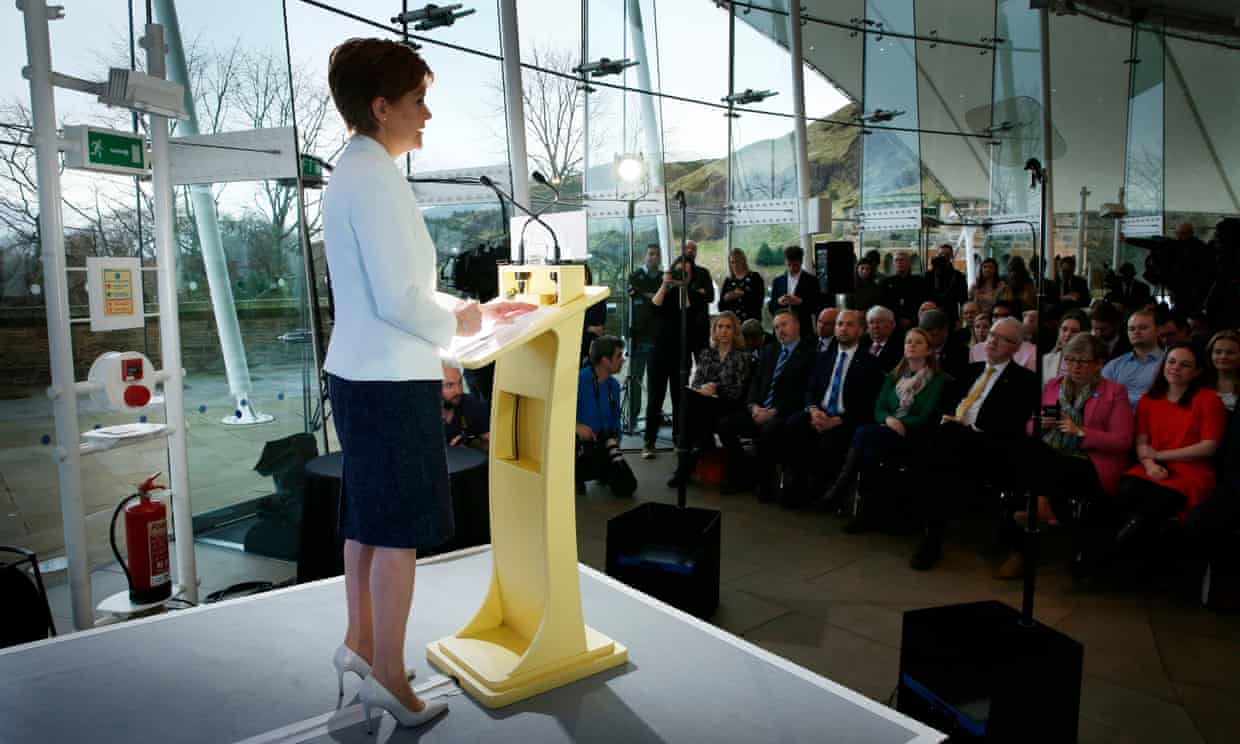Nicola Sturgeon
Sturgeon calls for unity and focus in push for Scottish independence
First minister plays down chances of a referendum this year as she laments Brexit
by Libby BrooksNicola Sturgeon has urged supporters of Scottish independence to stay “focused and united”, while ruling out – for now – holding a consultative referendum that would inevitably be challenged in the courts.
Two weeks after the prime minister formally rejected Sturgeon’s request for the legal powers to hold a second referendum, and as a poll put support for independence in the lead – by 51-49 – for the first time since 2015, Sturgeon told an audience of Scottish National party politicians and activists in Edinburgh that she would not “pretend that there are shortcuts or clever wheezes that can magically overcome the obstacles we face”.
Describing Brexit day as “one of real and profound sadness … tinged with anger”, Scotland’s first minister said: “What we in the independence movement must not do is allow a sense of frustration – understandable though it is – to take us down dead ends or weaken our sense of purpose.
“We must not let the Tories turn a positive, persuasive and invigorating discussion about the best future for our country into an arid and bitter argument about process and procedure.”
Pre-empting criticism from pro-independence hardliners, she added: “This isn’t caution talking. It’s realism.”
Sturgeon was addressing activists hours before the UK was due to leave the European Union, despite Scottish voters backing remain by 62% to 38% in 2016. Scotland’s newspapers reflected this fact, with the Daily Record carrying a mocked up image of the Brexit 50 pence coin with the words “Isolated, worse off, weaker and divided”, while the pro-independence National pictured a single candle alight with the plea “Leave a light on for Scotland”.

At lunchtime on Friday in Glasgow, the president of the European parliament’s Greens, Ska Keller, addressed a rally of Scottish Greens, with anti-Brexit protests also planned in Aberdeen. SNP MPs and prominent independence campaigners will join a candlelight vigil outside the Scottish parliament on Friday evening, while a pro-Brexit celebration was planned for George Square in Glasgow at 11.30pm.
While the SNP leader insisted when questioned by journalists that a referendum was “still practical” this year, her speech suggested her thinking was more pragmatic: “To achieve independence, a referendum, whenever it happens – whether it is this year as I want, or after the next Scottish election – must be legal and legitimate”.
Asked about the likely reactions of disappointment and frustration from the tens of thousands of yes supporters who have taken part in marches across Scotland over the past year, Sturgeon said she had “a duty to be frank”.
“Leadership is not about giving people the easy answers that are deceptively simple but turn out not to be the best way forward. We need to have a process that is legal and legitimate. If I thought a legal challenge would guarantee that process that would be one thing, but it might actually set us back.”
Instead, she told supporters to redirect their energies on “building and winning the political case for independence”.
Sturgeon said she would be doubling SNP campaign spending to focus on undecided voters. In the coming months, the Scottish government will publish a series of papers making a detailed case for independence, as well as bringing together a new constitutional convention – similar to that which paved the way for the Scottish parliament in the 1990s – to build support among civic Scotland.
At the same time, she will ask the Electoral Commission to test the question “should Scotland be an independent country”, which she described as “ the next practical step we need to take within our powers to prepare for a referendum”.
YouGov polling found that Brexit had significantly boosted support for independence, with 21% of those who voted no in the Scottish poll and in favour of remaining in the EU having changed their minds on independence.
Yes support was especially strong among those under 50, with 62% of 18- to 24-year-olds and 67% of 25- to 49-year-olds backing independence, which Sturgeon described as “phenomenal”.
Warning that there was a tendency within the yes movement to act as though people had already been persuaded, she said: “That job is still to be done. While we are in that war of attrition on the process, we shouldn’t be sitting doing nothing.
“If I thought there was an easier way I’d have taken it. That’s the reality. Stay focused, stay united, we are winning and we’ve got to stay the course.”